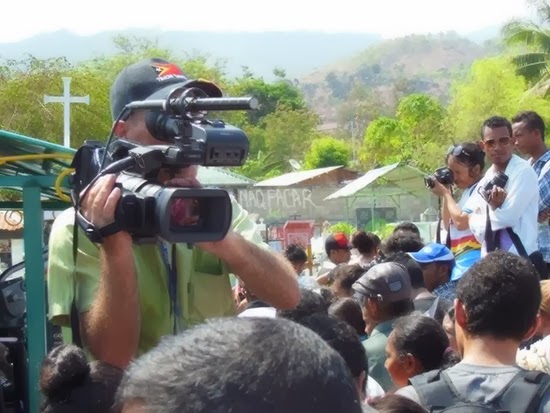
DILI (The Diplomat / Café Pacific / La’o Hamutuk / Sydney Morning Herald): The Journalists Association of Timor-Leste has joined local non-government organisations in condemning a proposed new law that will clamp down on media freedom by forcing journalists to register with the government.
Journalists who were tortured and imprisoned by the Indonesian occupiers before Timor-Leste won independence say they are willing to spend more time in jail opposing the bill, if necessary.
The Diplomat journalist Mong Palatino wrote that the bill could be unconstitutional as it violated constitutional rights to "seek, collect, choose, analyse and disseminate information".
The journalists association said that the bill did not "protect" the rights of Timor-Leste's journalists as it claimed to do, but instead was intended to police the press.
"It would be supremely ironic and tragic for East Timor to lose its independent media, after spending the past 500 years fighting repression, censorship and colonial rule," wrote Palatino.
The key problems with the proposed new law are that it will only allow government-registered journalists to write and publish stories; that a government funded press council will be set up, with wide-ranging powers to criminalise journalists; and that journalists will only be registered and permitted to work if they are employed by a "recognised media outlet" and if they have done an internship of at least six months in one of these outlets.
The new law aimed to "lock in the status and definition of journalists, effectively barring independent and freelance journalism and leaving the registration of journalists entirely to the whim of commercial media organisations", Pacific Media Centre director Professor David Robie wrote on Café Pacific last month.
Meanwhile, senior journalist José Belo, who was tortured by the Indonesian military and later founded the Tempo Semanal newspaper, told the Sydney Morning Herald that he was prepared go to jail to oppose the new law.
“The laws are dangerous. If they are passed I will oppose them and go to the jail. So too will other journalists here".
Belo told Café Pacific last year that that he had already been in trouble with the new Timor-Leste government in 2009 over his coverage of corruption and nepotism, having been threatened with jail time on a charge of criminal defamation against the then justice minister Lucia Lobato.
Lobato is now serving a five-year jail sentence for corruption. The charges against Belo were dropped after an international campaign by journalists, academics and media freedom campaigners.
Belo, who is also president of the Timor-Leste Press Club, was awarded one of the 2013 Sérgio Vieira de Mello human rights awards by the Timor-Leste president, Taur Matan Ruak.
This work is licensed under a Creative Commons Attribution-NonCommercial 3.0 New Zealand Licence.




